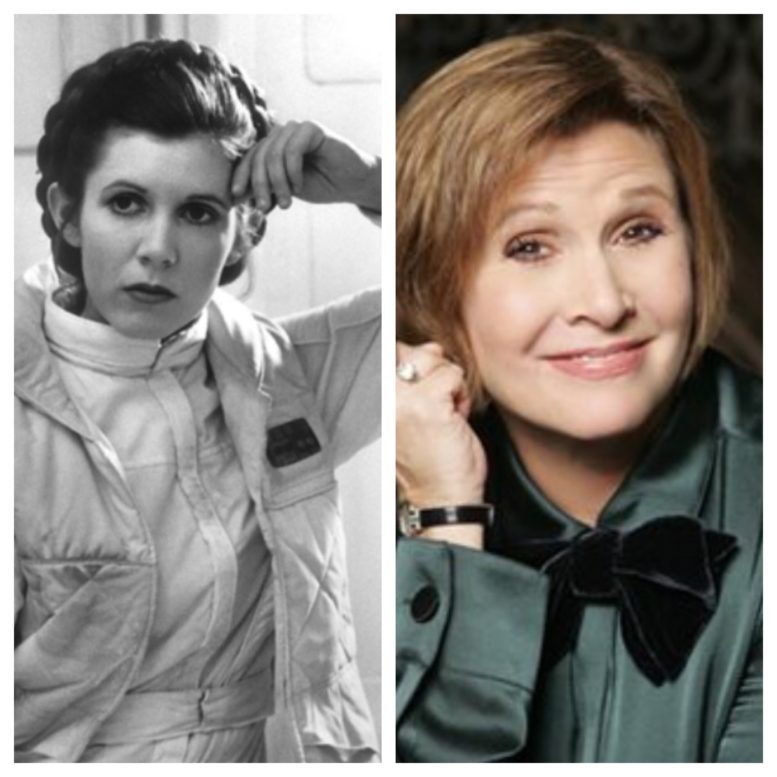By ELIZABETH ROBERTS-ZIBBEL
I couldn’t stop weeping when Carrie Fisher died.
Every new photo, tweet from one of her co-stars, or thoughtful personal statement from a Facebook friend would bring me to fresh tears. My grief pounded through me like the migraine that followed, triggered by crying and strong emotion.
I saw The Empire Strikes Back at a drive-in with my family when I was seven. I played Star Wars with my brother every day, Princess Leia to his Luke Skywalker. Of course I wanted to be Leia, wearing my hair in braids, brandishing her visage on tee shirts. In elementary school while anticipating the release of Return of the Jedi I had no idea how unusual it was for my favorite movies to have such a strong, fearless female character to emulate, more a warrior than a princess. Yes, she was beautiful, but in one of her very first scenes she stared unflinchingly right into Darth Vader’s helmeted face and informed him with steely eyes that he would regret holding her hostage. It would become clear that she was less afraid of him than any of her male counterparts were.

Carrie Fisher was a warrior herself, and a multi-talented one with much more to offer than adorable hair buns, a blaster, and a metal bikini. But rather than continuing to be bitter about the role that defined her, she decided to embrace Princess Leia, much as she did the experience of growing up as Hollywood royalty. Then, in the downtime after the Star Wars movies had been (everyone thought) completed, her drug use increased and she found herself in rehab after an overdose. That experience inspired her to write the thinly-veiled autobiographical novel Postcards From the Edge, and from that point on, she became a more and more outspoken advocate for mental health. After being diagnosed with bipolar disorder she wrote and spoke publicly about her private struggles with a refreshing forthrightness that made me feel not only that it was okay to be me, a creative adult with migraine and depression, but also that maybe I could write and talk about my experiences. That I could be as vocal, and honest, and brave.
In her later years, Carrie also took on sexism, body image, aging, and the double standards of the movie industry, endearing this new version of herself to fans and inspiring feminist think pieces and articles (like this one, from the Guardian: “Carrie Fisher is a national treasure“). She worked hard to fight the stigma of mental illness, openly discussing her experiences long before it was common practice. A meme that circulated right after her death contained the quotation “I am mentally ill. I can say that. I am not ashamed of that. I survived that. I’m still surviving it, but bring it on.”
Bring it on. Bring on the migraine, because I’ve survived this long and I will continue to. Bring it on, because I will talk about it and write about it and post about it and tweet about it. Bring it on because each individual who feels free to share their experience with pain and illness increases awareness and understanding, and helps people realize that yes, awesome famous people suffer. And normal everyday people suffer. And those suffering in silence may feel validated. And those misinformed about what migraine disease or bipolar disorder or any other stigmatized condition can do, what those illnesses are really like, may have learned something because a revered pop culture icon decided to share, unabashedly, her difficult truth.
Though her latest book The Princess Diarist does have the prescient feel of finally releasing her last big secret to the world, she still had more to say. She had more to do, more sequels in which to be General Organa, more episodes of Catastrophe, more red carpets to walk with Gary, her “very famous” therapy dog. She had more to teach us. And there is nothing wrong with grieving someone you may have never met, but who changed your life by helping you learn to be comfortable in your own skin, with your own mind and voice.
Princess Leia inspired me to be fearless. Carrie Fisher inspired me to be an advocate. And not an ordinary advocate, but one able to rise above judgment and dismissal with sassy, irreverent humor and a positive but defiant attitude. May all of us who battle daily with our own internal Darth Vader continue to fight, start a revolution, and become generals, with huge grins on our faces and our middle fingers in the air. There can be no better way to honor the brave, beloved, and beautifully flawed princess who has left us to live among the stars.
An earlier version of this piece was published on Migraine.com, where I am a featured writer and patient advocate.





